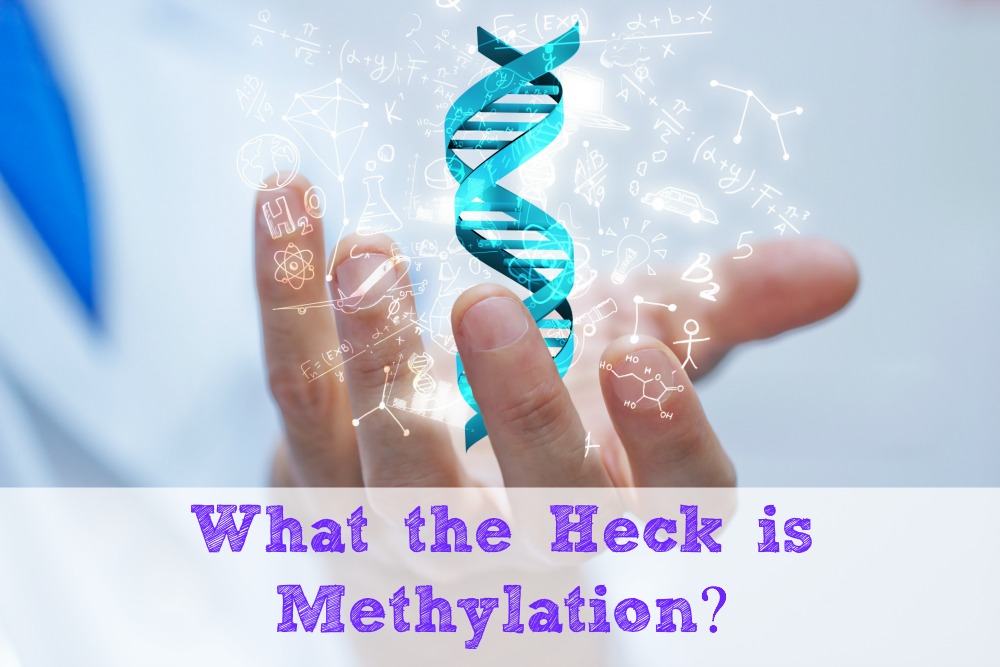It’s not so unusual for me to be following an emerging aspect of health science that most people haven’t yet heard of. My latest conquest: understanding methylation.
SO what the heck is methylation? Methylation is a biochemical process of cell and DNA maintenance and clean up. It is happening throughout your body millions of times every single minute, and happens constantly throughout your life. Without methylation, your body couldn’t survive. Intrigued yet?
The reason methylation is important is that some of us carry genetic variations called SNP’s (pronounced “snips”) that can impair our ability to efficiently perform methylation and the needed DNA maintenance to keep our bodies healthy.
The methylation cycle depends on many different genes, and the function of one or more of them may be impaired by the genes you were born with. As biochemical compounds move around the four methylation cycles, if an impairment is present, certain compounds may become elevated or depleted in bottlenecks created by your unique genetic weak links. Some of these bottlenecks can increase the risk of cardiovascular disease, neurotransmitter disorders, digestive problems, alzheimer’s disease, hormone metabolism problems, inflammation and autoimmune diseases, cancer, autism, ADD, chronic Lyme, chronic viral infection, and more. If you are someone suffering from complex, multi-system illness, exploring your genetics and your specific genetics related to methylation may provide some very useful information.
The good news is that knowing the appropriate information about your genetics can enable you to support your weak links in your chain with nutrition and lifestyle choices, which can help prevent or reverse current or future illness or disease. You owe it to yourself to learn about your genetics!
How to Assess Your Genes
To identify your particular genetic methylation weak links, you first need to have your genetics tested. This is a very simple saliva test, taken at home with a kit from 23andme or a similar service.
Buy a 23andme Genetics Screening Test Here
When you receive the kit, you register it online, take your saliva sample, and mail it in. Results typically arrive in 4-6 weeks.
Once you have your 23andme results, you need to send your data to a third-party service, which will evaluate and interpret the raw data, and send you a report describing whether you have the “normal” SNPs, or mutated SNPs. I like to use the report from Metabolic Healing which costs $37, or StrateGene, which costs $45. There are free reports available as well, such as from GeneticGenie, but they generally don’t check for as many SNPs, and are less complete.
What to Do With Your Genetic Information
Now that you have your genetic information and your report, you now need to consider how to interpret the information. It’s become quite popular for practitioners to look at those reports, and suggest supplementation based on your genetic SNPs. This is not an appropriate approach, in my opinion.
Your genetics are fixed, but just because you HAVE a SNP doesn’t mean that that SNP is expressing in a negative way. It’s important to consider the information you receive in the context of your actual medical and health history, and sometimes to perform current biochemical tests, such as blood, saliva, or urine tests to see if the SNPs are truly an issue. For example, if you have a mutation for the Vitamin D Receptor (VDR) gene, you don’t necessarily want to supplement with Vitamin D without testing your blood levels.
It’s a great idea to discuss this genetic information with your doctor or another practitioner who can help you interpret the results to create a plan. Click here to make an appointment with me to discuss your genetic results.
If you’d like to read more about methylation, I recommend an easy-to-understand book by Amy Yasko, called Feel Good Nutrigenomics: Your Roadmap to Health. This book describes the very complex science of methylation and genetics for the layperson, and provides a strategy to address your own personal genetic shortcomings to enhance your health. This can lay a foundation for either shifting your complex health issues, or practicing preventative health care for yourself and your family.
